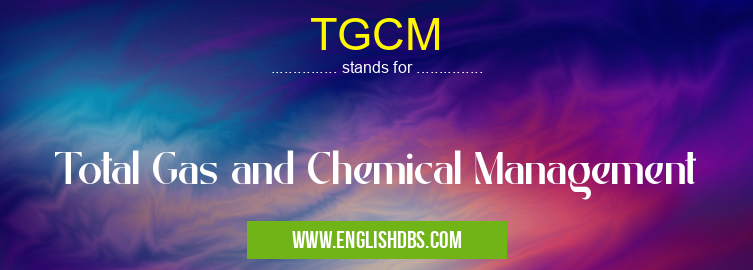What does TGCM mean in MANAGEMENT
TGCM is a comprehensive approach to managing the safe and efficient use of gases and chemicals throughout their lifecycle, from acquisition to disposal. It involves implementing policies, procedures, and technologies to identify, assess, and control risks associated with gas and chemical use.

TGCM meaning in Management in Business
TGCM mostly used in an acronym Management in Category Business that means Total Gas and Chemical Management
Shorthand: TGCM,
Full Form: Total Gas and Chemical Management
For more information of "Total Gas and Chemical Management", see the section below.
» Business » Management
- TGCM stands for Total Gas and Chemical Management.
- TGCM is a comprehensive approach to managing gas and chemical risks.
- It involves the identification, assessment, and control of these risks.
TGCM Components
- Risk Assessment: Identifying and evaluating potential gas and chemical hazards.
- Risk Control: Implementing measures to mitigate or eliminate identified risks.
- Training and Education: Providing training to employees on gas and chemical safety.
- Emergency Response: Developing and implementing plans for responding to gas and chemical emergencies.
- Continuous Improvement: Regularly reviewing and updating TGCM practices.
Benefits of TGCM
- Reduced risk of accidents and injuries.
- Improved compliance with regulations.
- Increased productivity and efficiency.
- Enhanced corporate reputation.
Essential Questions and Answers on Total Gas and Chemical Management in "BUSINESS»MANAGEMENT"
What is Total Gas and Chemical Management (TGCM)?
What are the benefits of TGCM?
TGCM can help organizations:
- Reduce the risk of accidents and incidents
- Improve compliance with regulatory requirements
- Enhance operational efficiency and productivity
- Protect the environment and human health
- Reduce costs associated with gas and chemical use
What are the key elements of a TGCM program?
Key elements of a TGCM program include:
- Risk assessment and management
- Inventory control
- Safe handling and storage procedures
- Training and education
- Emergency response planning
- Monitoring and auditing
How can organizations implement TGCM?
Organizations can implement TGCM by following a structured approach that involves:
- Identifying and assessing risks
- Developing and implementing policies and procedures
- Training employees
- Establishing an inventory management system
- Implementing safe handling and storage practices
- Developing emergency response plans
- Monitoring and auditing the program
What are some common challenges in implementing TGCM?
Common challenges in implementing TGCM include:
- Lack of awareness and understanding of gas and chemical risks
- Limited resources and expertise
- Complex and evolving regulatory requirements
- Integrating TGCM into existing operations
What are the latest trends in TGCM?
Emerging trends in TGCM include:
- Digitization and automation of TGCM processes
- Use of data analytics to improve risk management
- Focus on sustainability and environmental protection
- Increased emphasis on employee training and awareness
Final Words: TGCM is an essential practice for businesses that use or store gases and chemicals. By implementing a comprehensive TGCM program, businesses can significantly reduce their risk of gas and chemical-related incidents. This not only protects employees and the environment but also improves overall business operations.
